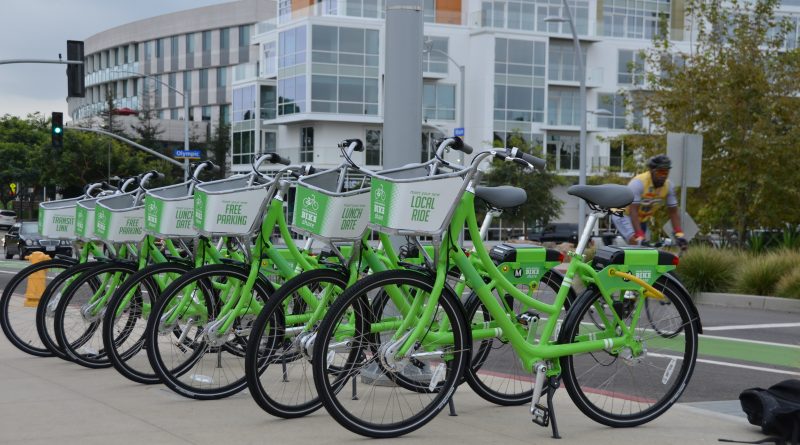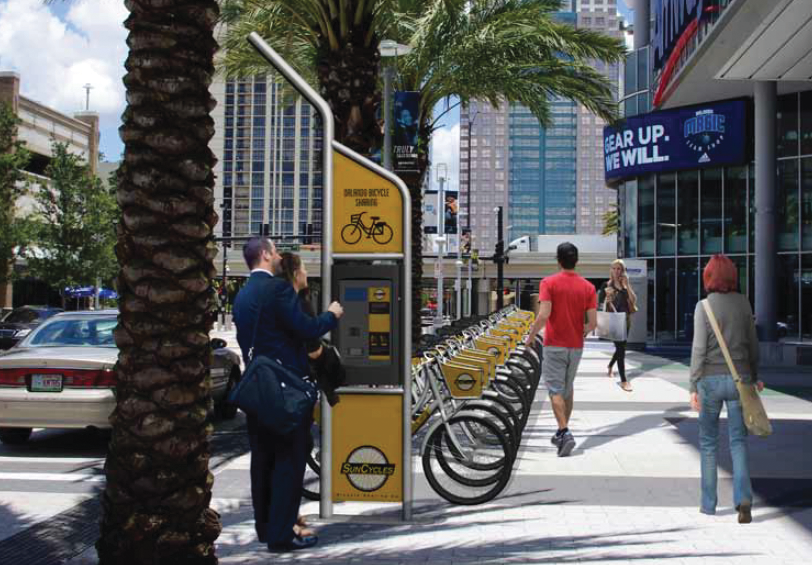Louisville will have to wait another year for its planned bike share system. While the city’s bike and pedestrian department, Bike Louisville, continues to make progress building bike lanes and neighborways, Coordinator Rolf Eisinger told Broken Sidewalk that the earliest the program could launch is next spring.
The city announced the bike share system in December 2014, hoping to launch in the summer of 2015. Plans call for 300 bikes to be distributed throughout 30 stations located in Downtown, Nulu, Butchertown, the Medical District, Smoketown, SoBro, Old Louisville, and around the University of Louisville’s Belknap Campus. (Humana has long-operated its own small private bike share system for its employees under the B-Cycle brand with a few stations around Downtown.)

Santa Monica–based CycleHop was selected to run Louisville’s program. When the program was first announced, the city said prices would range from $3 for a single trip over a 30 minute period to $7 for unlimited trips totalling no more than an hour over a 24-hour period.
In June 2015, Bike Louisville announced that the program was delayed a year, until summer of 2016. At the time, Eisinger said the delay was largely due to coordinating the locations of the bike share stations with utility companies, public works, and the state.
But as summer winds down, there are still no bike share stations parked on Louisville streets. Eisinger said the delays are not due to finding a sponsor for the program since it’s being paid for with user fees and $1.63 million in federal, city, and university funds: about $1.3 million from a federal grant, $250,000 from the city, and $70,000 from UofL. To date, no sponsor has signed on, however. As such, there’s no branded name for the program.
“I wish I had better information than we’re hoping to launch in the spring,” Eisinger said. “We’re working with our contractor, CycleHop, right now, finalizing some agreements.” He also said the program was delayed because of the process of using federal funds. He previously told WFPL in January that the federal grant must be approved by the Kentucky Transportation Cabinet.
“A lot of it was culture change,” Eisinger said. “This is something very different for our community. Getting everyone comfortable with the idea takes some time.”

While bike share might be different for Louisville, it’s nothing new around the United States. Just this summer, CycleHop launched programs in Atlanta; Cleveland; Vancouver, Canada; and West Hollywood. Louisville’s program is the only one still under development, according to the company’s website. Bike share systems also recently launched with different companies in Birmingham, Alabama; Buffalo, New York; Fort Wayne, Indiana; Los Angeles; and a long-delayed system in Portland, Oregon. In short, most cities across the country already have these systems in place. Louisville is officially playing catch up.
Still, some bike leaders in the city are skeptical of even a 2017 launch. “I’m not surprised it’s delayed,” Chris Glasser, executive director of Bicycling for Louisville, told Broken Sidewalk. “Spring 2017 isn’t realistic either. Bike share needs safe east–west connections across Downtown to be viable, and there’s no political will in the Mayor’s office or Metro Council to see that those kinds of facilities go in.” He pointed to Jefferson, Market, and Main streets as being grossly overbuilt for automobile traffic, noting that they are ripe for lane reductions. A major redesign of East Market Street including a potential protected bike lane is planned but long behind schedule.
Glasser would also like to see the target area for bike share stations expanded. “Bike share will be a failure until it includes the inner Highlands,” he said. “Expand the service area and create a safe connection into Downtown, and then you’ll have the possibility of a viable bike share system.”
In many cases of successful bike share systems, a robust network of bike infrastructure has proven to be key. Glasser expects the winners and losers of the recent rapid expansion of bike share across the country to become clear in coming years. He pointed to a system in Seattle that’s already facing ridership and financial struggles.
Bike share systems are more than short term bike rentals placed throughout the city. They’re considered an extension of a city’s transit system. They help bridge that last mile between taking transit and a person’s destination. They’re also potentially effective at reducing vehicle miles traveled as they simplify diverting short trips from the automobile to bike.

In the meantime, the city has also not yet finalized the locations of where the bike share stations will be located, and Eisinger said citizens can still weigh in using an online mapping tool. “We still have our ‘Suggest-a-Station‘ [website] online,” he said. “We welcome people to do that.” You can view that website here (be sure not to use the www. or it won’t work).
Ultimately, it’s better late than never for Louisville’s bike share ambitions. We’ll be just as excited if it launches next year as if it launched this summer. But it would be nice to get ahead of the game on something like this rather than let other cities like Chattanooga, Birmingham, Greenville, S.C., Madison, Wis., and Milwaukee take the lead. The future of Louisville depends on the city competing on a national stage.



Brandon, you’ve done great work with your Broken Sidewalks blog. This is one of the most important posts you’ve ever written. The potential benefits of active transportation in Louisville cannot be overstated. Yet we have a sort of inertia here that is very hard to overcome. Thanks for bringing this into focus.
While I am excited to see general progress I have to wonder if the biggest issue this new system will experience is being overpriced. How much will it cost to ride the bus + rent a bike to a final destination? Now compare that cost to downtown parking or even free street parking for the person willing to walk a little/hop the zeobus.
I just returned from two cities with somewhat new bike share systems. Chicago with prices so high that only tourist use then (and the system is under utilized), and a Chinese city where the bike system is free for one hour per day and then increasingly more expensive per hour rented (for example, 1 hour free, 2 hours 1 dollar, 3 hours 4 dollars etc.) Of course this is not China but I do think people need to see at least a little savings potential to get the masses interest and therefore more revenue comin in.